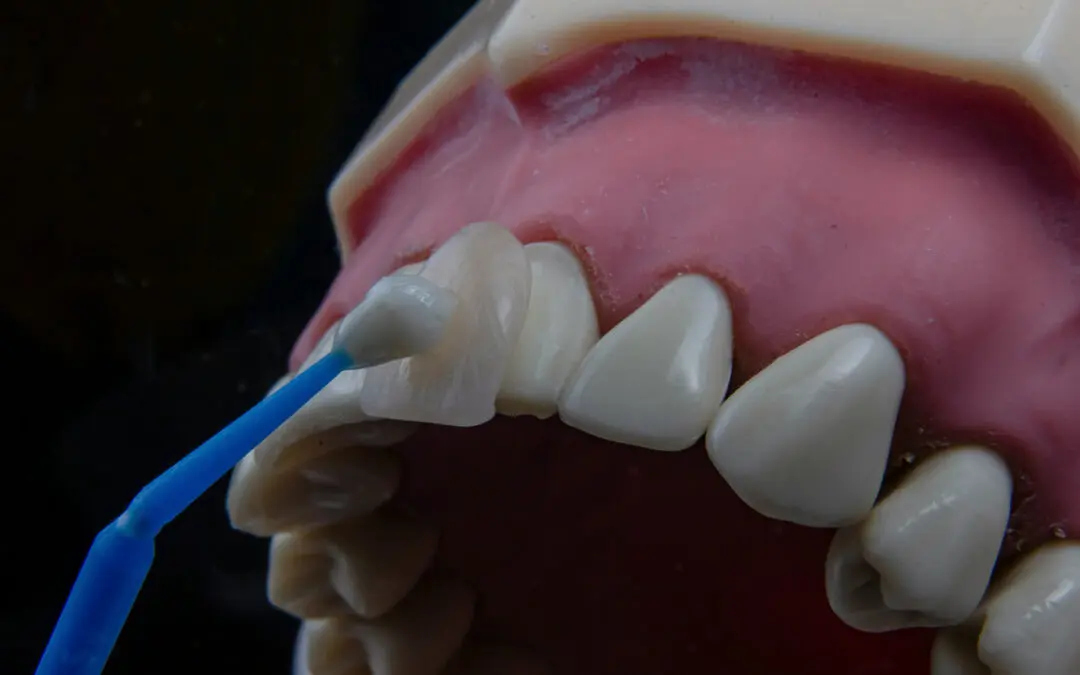If you’ve been thinking about improving your smile, you may have come across veneers as an option.
In short, dental veneers are thin shells placed on the front surface of your natural teeth to improve their appearance. They are custom-made to fit perfectly, and can be crafted from porcelain or composite resin. Veneers are an excellent solution for chipped teeth, stained teeth, misaligned teeth, or misshapen teeth. With proper care, they offer a long-lasting way to achieve your dream smile.
Now let’s go deeper into the details, so you know what’s involved in the procedure and if this treatment might be a suitable option for you.
What Are Dental Veneers?
Dental veneers are part of cosmetic dentistry, designed to improve your smile while still protecting your dental health. Veneers are thin shells, usually made of porcelain or composite resin, that bond to the front surface of your natural teeth with a strong dental adhesive. Because they are custom-made, your veneers fit perfectly to your mouth and look natural.
Porcelain veneers are popular because they are stain-resistant and very durable, while composite veneers are a more affordable choice. Both can address dental issues like crooked teeth, chipped teeth, or discoloured enamel.
Why Consider Veneers?
Many patients choose veneers to help with:
- Stained teeth that don’t respond to teeth whitening
- Chipped or broken teeth that happen unexpectedly
- Crooked or misaligned teeth
- Misshapen teeth or uneven spacing
Veneers can boost your self-confidence and help you feel proud of your smile. Unlike dental implants or crowns, which are used for larger structural issues, veneers focus on appearance while still supporting overall dental health.
The Process of Getting Veneers
- Initial consultation: Your dentist will review your oral health and talk with you about your goals. They’ll also make sure you’re a good candidate by checking for gum disease or periodontal disease that needs to be treated first.
- Tooth preparation: A small layer of enamel is removed from the prepared tooth so the veneer can fit smoothly.
- Temporary veneers: You may wear temporary veneers while waiting for your custom veneers to be made.
- Fitting the veneers: During your next appointment, your dentist will bond the permanent veneers using a strong dental adhesive.
With proper care and regular dental visits, veneers can last for many years.

Caring for Your Veneers
Once your custom veneers are placed, proper care helps keep them looking their best and protects your overall dental health. While porcelain veneers and composite veneers are strong and stain-resistant, they still need the same attention you’d give to your natural teeth.
Here are a few tips for everyday care:
- Maintain regular dental visits: Routine cleanings let your dentist check both your veneers and your gums, catching any dental issues before they become bigger problems.
- Practice good daily dental care: Brushing and flossing help prevent gum disease and protect the tooth underneath the veneer. Use a non-abrasive toothpaste to avoid scratching the front surface.
- Avoid biting hard objects: Ice or even fingernails can chip veneers. Treat them as you would your natural teeth and avoid biting into hard objects.
- Watch for habits like clenching: If you grind or clench your teeth, your dentist may suggest a night guard to protect your veneers and natural enamel.
- Choose the right foods: You can eat normally with permanent veneers, but cutting up crunchy foods instead of biting into them directly helps prolong their life.
- Stay mindful of your gums: Healthy gums frame your beautiful smile. Untreated periodontal disease or gum disease can affect how veneers sit and look over time.
With proper care, veneers can last 10–15 years or longer. Think of them as part of your long-term dental care routine, just like crowns, implants, or other cosmetic dentistry treatments.
Other Cosmetic Dentistry Options
At our Barrhaven dental office, veneers are just one of the many dental services we provide. Depending on your needs, you may also consider:
- Teeth whitening for stained teeth
- Dental bonding for small chips or gaps
- Dental crowns for a prepared tooth that needs more coverage
- Dental implants to replace missing teeth
Our welcoming environment is designed to help patients feel at ease, no matter the treatment.
FAQ
How much do veneers cost in Ottawa?
Costs vary depending on whether you choose porcelain or composite resin veneers, and how many teeth are being treated. Porcelain veneers are more expensive but last longer.
Is there a downside to getting veneers?
Veneers require removing a thin layer of enamel, so they are a permanent procedure. Some patients may also need replacements after many years of use.
How to prepare for getting veneers?
Your dentist will recommend treating any gum disease or dental issues first. A healthy foundation of gums and teeth makes you a good candidate for veneers.
Does OHIP cover veneers?
No, veneers are considered part of cosmetic dentistry, so OHIP does not cover them. Some dental insurance plans may help, depending on your coverage.
Can you eat with veneers?
Yes, you can eat normally with permanent veneers. Just avoid biting hard objects like ice or eating sticky foods to protect them.
How many visits do veneers take?
Most patients need two to three dental visits: one for the initial consultation, one for preparing the tooth, and another for placing the veneers.
How long do veneers take to fit?
After the prepared tooth is ready, it usually takes a couple of weeks for custom veneers to be made. Once they’re ready, fitting them only takes one appointment.

